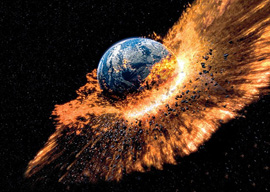
December 30, 2011

Will we lament that we are no longer the teeming masses? Individuals are harder to make a team of, but they are therefore harder to yoke. And their numbers are growing exponentially.
The limitation of our freedom that becomes palpable with global warming is the paradoxical outcome of the very exponential growth of our freedom and power, that is, of our growing ability to transform nature around us, up to and including destabilizing the very framework for life.
A rather limited view of freedom. If we’re looking for a culprit it must be the one who is getting fatter, not the one who is getting stronger.
Marshes are trod upon and bees are dying en masse, but one behemoth is still thriving. It is so evolved that it can breathe the most pestilential air, so resilient it can absorb any criticism. Though it is difficult to fight against, it is not too disagreeable to live in the belly of that beast.
Perhaps therein lies the fundamental “contradiction” of contemporary “postmodern” capitalism: while its logic is de-regulatory, “anti-statal,” nomadic and deterritorializing, etc., its key tendency…signals a strengthening of the State…and its legal and other apparatuses. What one can discern on the horizon is thus a society in which personal libertarianism and hedonism co-exist with (and are sustained by) a complex web of regulatory State mechanisms.
Zizek is in the thick of it, looking for signs of the future in the entrails of Islamic terrorists, Austrian pedophiles, and B movies; diagnosing with the terms of psychoanalysis and quantum physics, which states by the way “that it is impossible to simultaneously measure the present position while also determining the future motion of a particle.”
We can’t escape the forces of physics; what about the illusions of power?
[T]he lesson of the 20th century is that victory ends either in restoration (return to the state-power logic) or an infernal cycle of self-destructive purification. This is why Badiou proposes replacing purification with subtraction: instead of “winning” (taking power) one maintains a distance towards state power, one creates spaces subtracted from State.
Which brings us to literature. Julian Barnes just won the Man Booker Prize for his novel The Sense of An Ending. Like Living in the End Times, it also deals with time, history, and power. It talks of time without hubris and history of the personal sort. It also speaks of power—not so much as a paradox or a contradiction, but as a mystery because it emanates from a woman. At the end, there’s even a revelation.